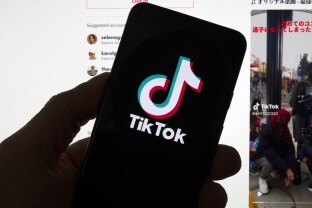In a rare move, Republicans are breaking away from Donald Trump in supporting a bill that could functionally lead to a U.S. ban of TikTok if the app’s Chinese owners don’t sell it.
Rep. Mike Gallagher, who introduced the bill that the House is set to vote on on Wednesday, told NOTUS that Trump’s opposition would not sway his colleagues from supporting the bill. Instead, he credited the former president for starting the move against TikTok’s ownership during his administration, and he said that if the bill somehow sticks around through early next year, it could present a new President Trump with an early-term victory.
Gallagher said the bill “would furthermore put Trump in a position, depending on the timeline of when it’s passed, to consummate the deal of the century. And for a man who fancies himself a dealmaker, I would imagine that’s an attractive prospect.”
As president, Trump signed an executive order in 2020 banning U.S. companies from having transactions with ByteDance, TikTok’s parent company; Biden reversed that executive order in 2021. However, Trump changed his position last week when he opposed a prohibition on TikTok, arguing that it would empower Meta, one of its biggest competitors. The former president told CNBC that while he does believe TikTok is a national security threat, he also has privacy concerns over other social media apps, suggesting TikTok should not be singled out.
Other companies, Trump said, “get the information, and they deal with China, and they’ll do whatever China wants. … That’s a national security risk also.”
Rep. Chip Roy said Tuesday that he understands the president’s concerns that “there are other companies that raise issues,” but that in this particular case, “we’re trying to be very careful about American-owned companies, to not have the power of our government overstep,” while focusing on Chinese companies that could pose a unique threat.
Republicans are careful to say that the bill is not a ban but rather a requirement for ByteDance to divest TikTok. That hasn’t stopped TikTok from calling it a “de facto ban” and pushing its multitude of users to call members of Congress to urge them to vote against it.
Trump’s opposition, though, is already creating a rift in the conservative movement as a whole.
It’s extremely uncommon for House Republicans to oppose Trump on policy so openly. Major conservative groups like Heritage Action and Americans for Prosperity are backing the House bill, while Club for Growth has long opposed restricting TikTok.
Club for Growth has significant help on its side. Kellyanne Conway has been lobbying in Congress on its behalf in support of TikTok, and Republican megadonor Jeff Yass, who holds a major stake in ByteDance and helps fund Club for Growth, met with Trump last month. Steve Bannon, still a close Trump ally, suggested on Gettr that Trump changed his mind because of Yass; Trump told CNBC that he and Yass did not talk about TikTok when they met.
Former Vice President Mike Pence, no longer a close Trump ally, said in a Fox News op-ed that TikTok is “digital fentanyl” and that it is “simply unacceptable” to let the app remain under a Chinese company’s control.
“I mean, we passed an executive order along those lines in 2020,” said Marc Short, a longtime adviser to Pence and his former chief of staff. He added that Trump’s sudden opinion change is just another example of him veering “off course,” as he has done with “positions he’s had on life, positions he’s had about the Supreme Court, positions he’s had on spending, positions he’s had on foreign policy.”
Some House members who are closely aligned with Trump are still making up their minds. Tennessee Rep. Tim Burchett said his choice comes down to “First Amendment versus Communist China molding young American minds,” and that he hasn’t “even read” what Trump has said about the bill. Pennsylvania Rep. Dan Meuser, who serves on Trump’s campaign team in the state, said he also remains on the fence.
“[Trump] gets his intel, just like if a member came up to me, like Mike Gallagher, he weighs into my decision-making,” Meuser said.
Should the bill make it to the Senate, its path there is more uncertain. Sen. Mike Braun, an avid Trump supporter, told NOTUS he was still undecided on the bill but that the former president’s stance “will weigh into whether it makes it across the finish line.”
“I think Trump is right. You don’t want to empower certain technology companies at the exclusion of others, especially technology companies that, let’s be honest, have been much harder on conservatives than they have been on the left,” said Sen. J.D. Vance of Ohio, another Trump ally. “But I think you can hold both of those thoughts in your head at the same time: You can say, ‘Yeah, TikTok’s a problem, simultaneously we don’t want to do something against TikTok in a way that empowers these other technology companies.’”
Sen. Rand Paul took a much firmer position, telling reporters he has First Amendment concerns. “I don’t think Congress should take away the First Amendment rights of 180 million Americans” who use TikTok, the Kentucky senator said. He added that he would attempt to block the bill if he found it “contrary to the Constitution.”
—
Oriana González is a reporter at NOTUS. Katherine Swartz is a NOTUS reporter and an Allbritton Journalism Institute fellow.
Sign in
Log into your free account with your email. Don’t have one?
Check your email for a one-time code.
We sent a 4-digit code to . Enter the pin to confirm your account.
New code will be available in 1:00
Let’s try this again.
We encountered an error with the passcode sent to . Please reenter your email.


